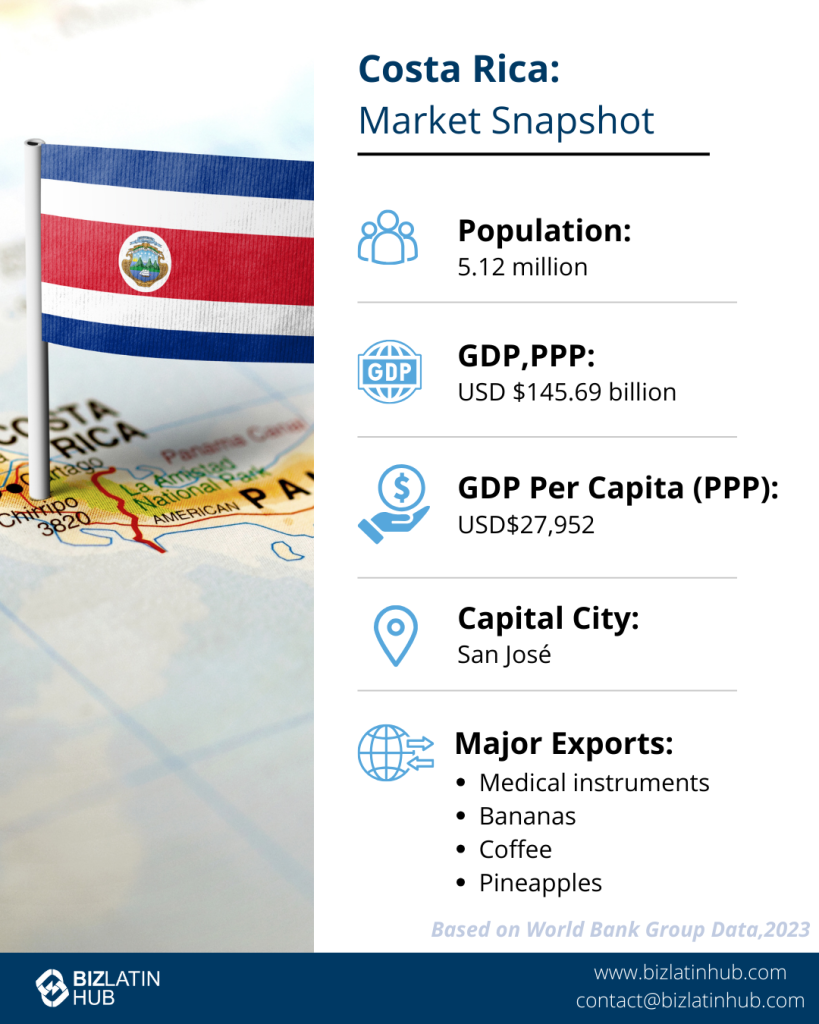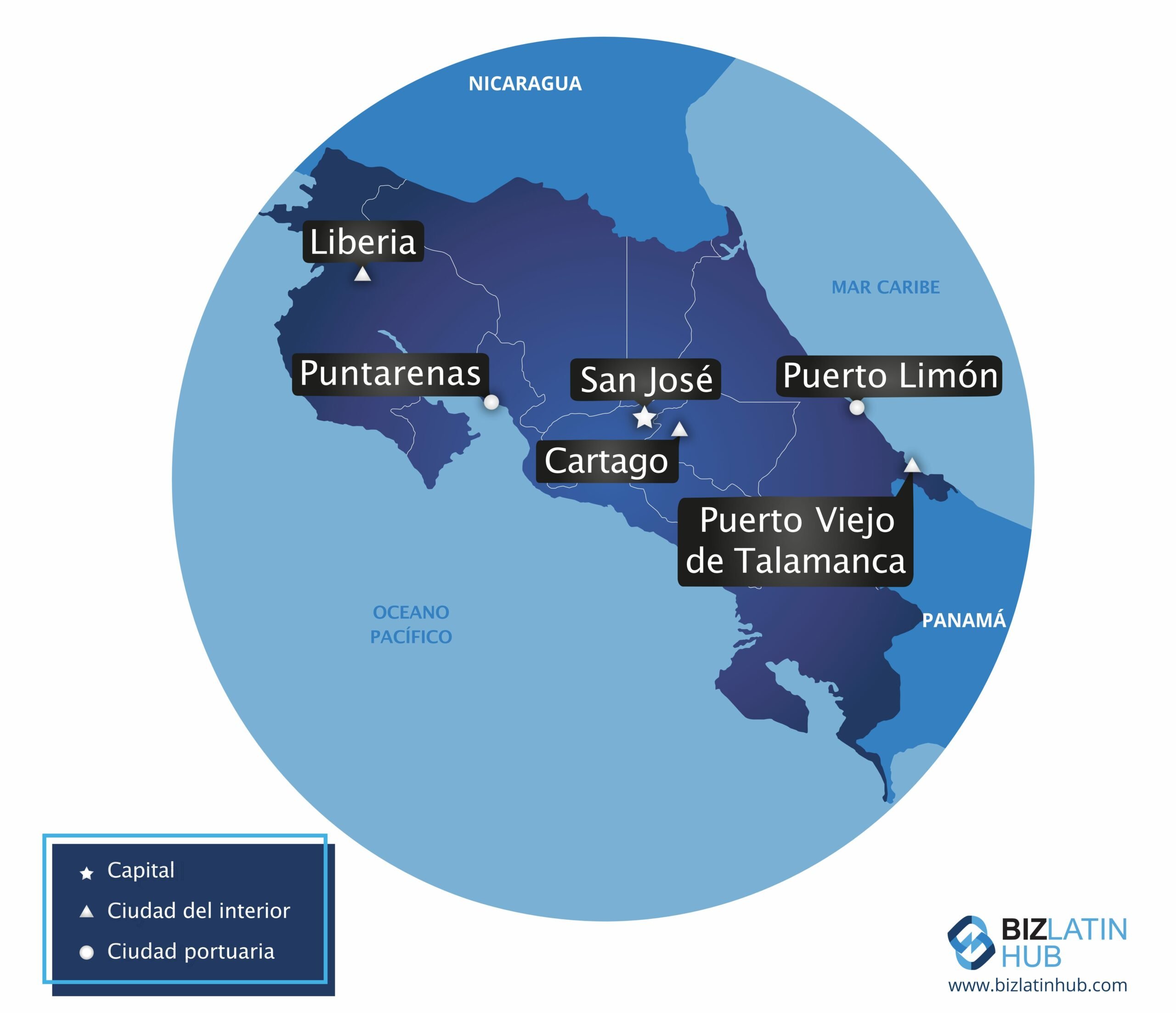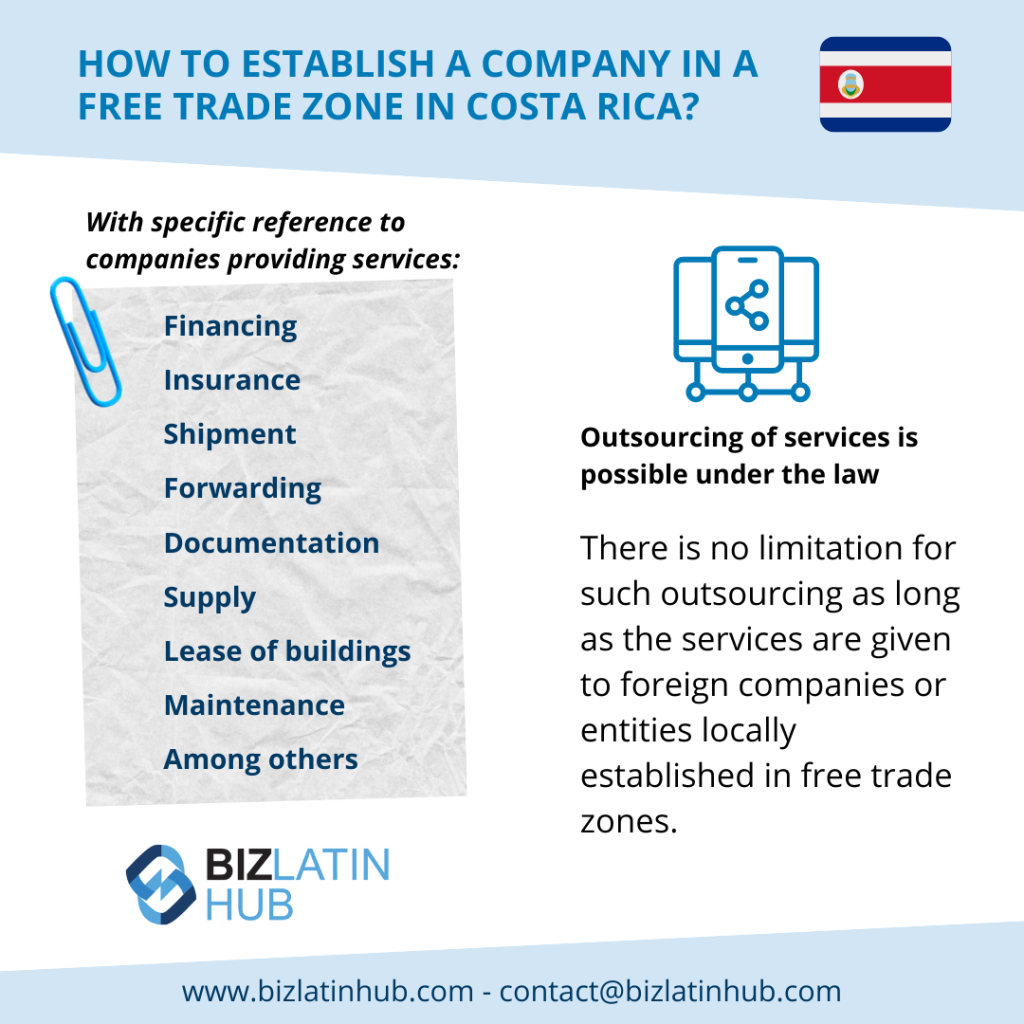The country is generally open to foreign investment when it comes to starting a business in Costa Rica and has a business-oriented mindset in government that explains much of its recent success. While other countries in the region often take the limelight, Costa Rica is focused on simply getting on with things and is there or thereabouts in a whole host of economic indicators among Latin American countries. For anyone looking to register a company in Costa Rica, the future looks bright.
Key takeaways on doing business in Costa Rica
| Is foreign ownership allowed in Costa Rica? | Yes, 100% foreign ownership is allowed for investors doing business in Costa Rica |
| Most important sectors in Costa Rica | Some of the most common fields include: Aerospace engineering. Automotive parts manufacturing. Biotechnology. Consumer electronics. Electronic components assembly. Machine repair/maintenance. Medical devices. Metal work. Pharmaceuticals. Renewable energy. Software development. Telecommunications. |
| Are there Free Trade Zones in Costa Rica? | There are over 40 FTZ parks in the country, especially around the Greater Metropolitan Area (GMA), near San José. |
| Incentives for Foreign Direct Investment in Costa Rica | The government encourages FDI by slashing taxes and easing residency requirements for investors to attract more foreign remote workers to the country. The Costa Rican government has also introduced the Green Protocol. |
| International links | Yes, it has signed free trade agreements with a host of countries, including the U.S and E.U as well as CARICOM and others. |
Doing business in Costa Rica: a favorable market for investors
Costa Rica is well-known for having no standing army, instead relying on the support of the United States — its close ally and number one trade partner — to guarantee national security.
The Central American nation is able to adopt such a policy because of the long-standing political and economic stability the country has enjoyed, as well as the strong political and cultural ties it has with its regional neighbour.
That includes a large population of expats, including investors, remote workers, and retirees, attracted by low violent crime levels and one of the highest levels of English proficiency in the region. Recently the government has been making significant efforts to rejuvenate the economy.
Recently, starting a business in Costa Rica was made even more attractive when the government announced new measures to encourage FDI by slashing taxes and easing residency requirements for investors.
A law was also introduced to attract more foreign remote workers to the country. The Costa Rican government has also introduced a scheme, known as the Green Protocol, offering more credit for environmentally-friendly businesses.
All of these factors combine to make starting a business in Costa Rica an attractive prospect for foreigners and there has never been a better time to do it. The future is bright for this small but well-positioned nation, currently boasting an economy worth more than USD$65bn despite only having 5 million residents.
Sectors for doing business in Costa Rica

Business opportunities in Costa Rica are remarkable for having an impressive variety of sectors that are showing growth, with large investment being pumped into the economy as a result. Examples of these industries include the exportation of coffee and bananas and a booming tourism industry.
However, there are also business opportunities in Costa Rica in more modern service-based sectors as the country strives to respond to new market necessities. There is a well trained and educated workforce, which means the country is well placed to handle a shift into new technologies, including tech.
The country continues to diversify its economy and attract investments across various sectors. Business opportunities in Costa Rica are huge, especially in emerging service-based industries, as the country adapts to evolving market demands and technological advancements.
The OECD forecasts significant economic growth for Costa Rica in 2025, reflecting the country’s efforts to diversify its economy and attract investments across multiple sectors.
This means more interest in how to register a company in Costa Rica, particularly in emerging service-based industries as the economy responds to changing market dynamics and embraces technological advancements.
Economic activity is mainly in the service sector, agriculture and tourism. Although these are the main sources of income for the country, with the emergence of better and more advanced technology in the last two decades or so, business opportunities in Costa Rica have started to develop in less traditional sectors.
Free Trade Zones for doing business in Costa Rica

For decades, Costa Rica has implemented policies aimed at attracting international companies, and it is safe to say that these initiatives have been overwhelmingly successful. One of the main strategies employed by this Central American nation to attract international companies, both large and small, is allowing the establishment of a company in a Free Trade Zone in Costa Rica.
The zones offer a number of attractive benefits for both foreign and local investors. For example, there are tax incentives and import duty exemptions. Key policies such as this make them very attractive places to do business. Certain business sectors are particularly encouraged within these special economic areas, including service provision under certain conditions.
In summary, establishing a company in a Free Trade Zone in Costa Rica represents a strategic opportunity for companies looking to expand their international presence and take advantage of the many benefits offered by Costa Rica’s business-friendly policies and favorable economic climate. Biz Latin Hub can help you set up shop and support you doing business over the years to come.

FAQs on doing business in Costa Rica
Answers to some of the most common questions we get asked by our clients.
1. Can a foreigner own a business in Costa Rica?
Yes, a business can be 100% foreign-owned by either legal persons (legal entities) or natural persons (individuals).
2. Are there Free Trade Zones in Costa Rica?
| There are over 40 FTZ parks in the country, especially around the Greater Metropolitan Area (GMA), near San José. The zones offer a number of attractive benefits for both foreign and local investors. For example, there are tax incentives and import duty exemptions. Key policies such as this make them very attractive places to do business. Certain business sectors are particularly encouraged within these special economic areas, including service provision under certain conditions. |
3. How long does it take to register a company in Costa Rica?
In Costa Rica, both S.A (Sociedad Anónima) and S.R.L (Sociedad de Responsabilidad Limitada) are limited liability entity types.
4. Which sectors are important in Costa Rica?
The country continues to diversify its economy and attract investments across various sectors. Business opportunities in Costa Rica are huge, especially in emerging service-based industries, as the country adapts to evolving market demands and technological advancements. The OECD forecasts significant economic growth for Costa Rica in 2024, reflecting the country’s efforts to diversify its economy and attract investments across multiple sectors.
5. Does Costa Rica have trade agreements with other countries?
Yes, it has signed free trade agreements with a host of countries, including the U.S and E.U as well as CARICOM and others.
6. What entity types offer Limited Liability in Costa Rica?
The Sociedad por Acciones (SpA) and Sociedad de Responsabilidad Limitada (SRL) both provide limited liability protections to their owners in Costa Rica.
Biz Latin Hub can assist you with doing business in Costa Rica
At Biz Latin Hub, our team of corporate support professionals is available to assist you starting a business in Costa Rica.
We offer a comprehensive portfolio of back-office services including company formation, accounting & taxation, legal services, visa processing, and hiring & PEO, meaning that we can provide tailored packages of services to suit every need.
As well as supporting investors entering and doing business in Costa Rica, we also have teams in place in 15 other markets around Latin America and the Caribbean, and specialise in multi-jurisdiction market entries.
Contact us today to discuss how we can help you reach your commercial goals.
Or read about our team and expert authors.






